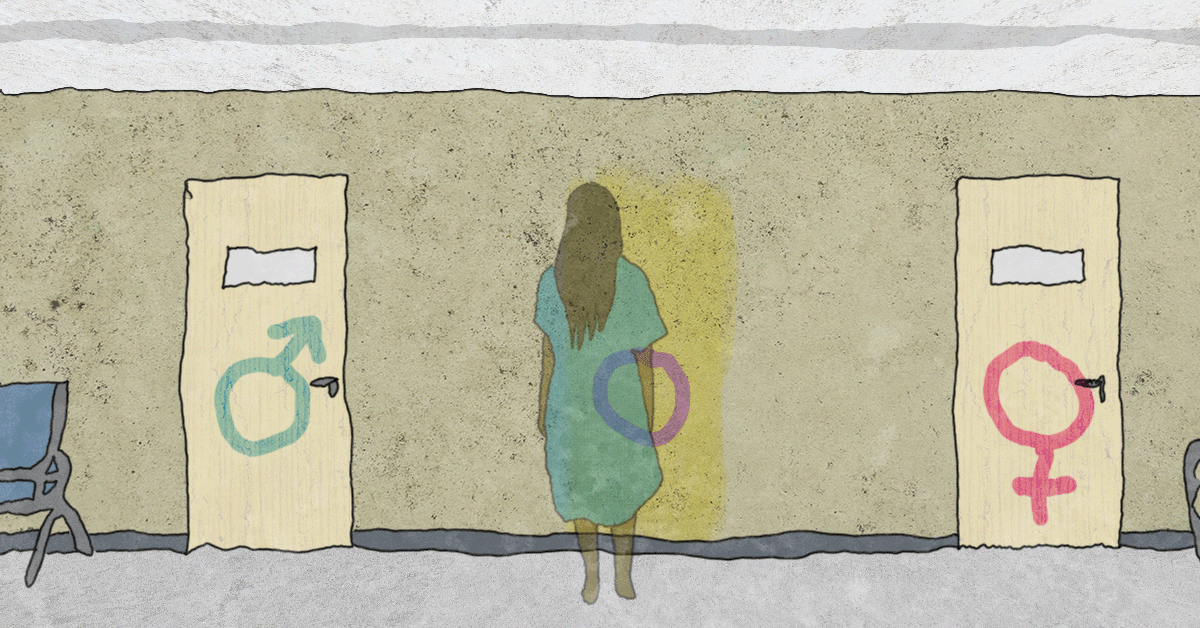“He asked if I was a man or woman”: Kenya’s intersex people vs. its healthcare system
- While Kenya has made strides in recognizing intersex rights, the medical sector remains ill-equipped to meet their needs, hindering intersex individuals from accessing quality healthcare.

Image description: A patient standing in a hospital hallway between two doors—one marked with the male symbol and the other with the female symbol. The patient appears translucent, revealing the intersex flag painted on the wall where a door should be.
Nairobi, Kenya (Minority Africa) — On a cold, rainy morning in March 2024, Magdaline Nyambura woke up with severe stomach cramps. Her period was heavier than usual, and she needed urgent medical attention.
Braving the rain and cold, she made her way to the nearest hospital, five kilometers from her home.
“I had never experienced such an occurrence. The pain was excruciating and the nearest health center was my first stop, “Nyambura tells Minority Africa.
Nyambura, 25, is intersex, with a conventionally masculine physical appearance. When she explained her symptoms to the medical officer, his reaction left her feeling alienated.
“He asked if I was a man or woman. I felt offended and walked out,’’ she says.
Forced to seek treatment at a private hospital, she had to rely on her sisters to help cover the medical bill.
Complicated affair
For Nyambura, accessing healthcare as an intersex person is fraught with challenges.
“In 2023, I sought services from a reproductive health clinic of a public hospital and it wasn’t easy explaining my situation because at first they thought I was gay,’’ she says.
Nyambura notes that many healthcare workers in Kenya’s public hospitals have a limited understanding of intersex conditions.
“The confusion is on whether they should treat you as a man or woman. They can’t just get it when one says they are intersex,’’ she says.
Stigma from some healthcare providers, Nyambura observes, drives many intersex individuals away from public hospitals.
“Private hospitals are more welcoming and despite the cost effect, I prefer them for the sake of my wellbeing.”
Progress and policy gaps
Kenya has made notable strides in recognising intersex rights. The National Reproductive Health Policy 2022-2032 aims to ensure intersex individuals attain the highest standard of reproductive health. The Intersex Persons Society of Kenya played a key role in shaping this policy.
The Children Act 2022 was amended to recognise intersex as a third gender, making Kenya the first African country to grant this legal recognition. The law mandates equal access to essential services, including healthcare, for intersex children.
However, Ryan Muiruri, Program Director at Intersex Persons Society of Kenya, points out that Kenya still lacks healthcare guidelines tailored to intersex individuals.
“Intersex individuals feel unsupported and unprotected whenever they visit public health facilities. Our health policy is not fully inclusive and limited specialists who understand intersex conditions make the situation even more complicated,” Muiruri tells Minority Africa.
Kenya’s parliament is currently considering the Intersex Persons Bill, 2024, which seeks to guarantee intersex individuals the right to healthcare that is respectful and free from intrusive or involuntary medical procedures.
Sponsored by the Kenya National Commission on Human Rights (KNCHR), the bill proposes that intersex individuals needing to verify their sex obtain a medical report from a qualified practitioner.
“The medical report so referred to shall contain the name and age of the intersex person and the intersex condition or variation of the person,” the bill states.
It also mandates that healthcare providers respect the dignity, privacy, physical integrity and autonomy of intersex patients and obtain informed consent before any medical testing or procedures.
Additionally, the bill proposes the creation of an Intersex Persons Health Council to develop comprehensive healthcare guidelines for intersex individuals.
Roseline Odede, KNCHR chairperson, emphasises that the bill seeks to guarantee holistic healthcare for intersex persons.
“All we want is a system that encompasses physical, mental and emotional health aspects,’’ she says.
According to Odede, if passed, the law will also provide psychosocial support for intersex persons and their families
“We also want to address the issue of lack of training among health workers on how to handle intersex patients,” she says. “This law will help cure stigma and discrimination intersex individuals often encounter within healthcare settings.”
Nyambura eagerly awaits the bill’s passage, believing it will be a turning point in the fight against health-related stigma.
“The proposed law is not all about quality healthcare for us but also restoring our dignity as intersex persons.”
Edited/Reviewed by: PK Cross and Uzoma Ihejirika.
Illustrated by: Rex Opara Jr.
Jackson Okata is a multiple award-winning journalist based in Nairobi, Kenya. Jackson boasts of experience in both broadcast, print and online journalism spanning over 8 years. Jackson specializes in agriculture, environment, women and gender, political and governance, tech and innovation, science as well as education stories. Jackson is a fellow of Health Journalism Network, Earth Journalism Network, Internews, Journalists for Human Rights, Africa Centre for Media Excellence (ACME), LIDA Network, YALI Network and Thomson Reuters Foundation






